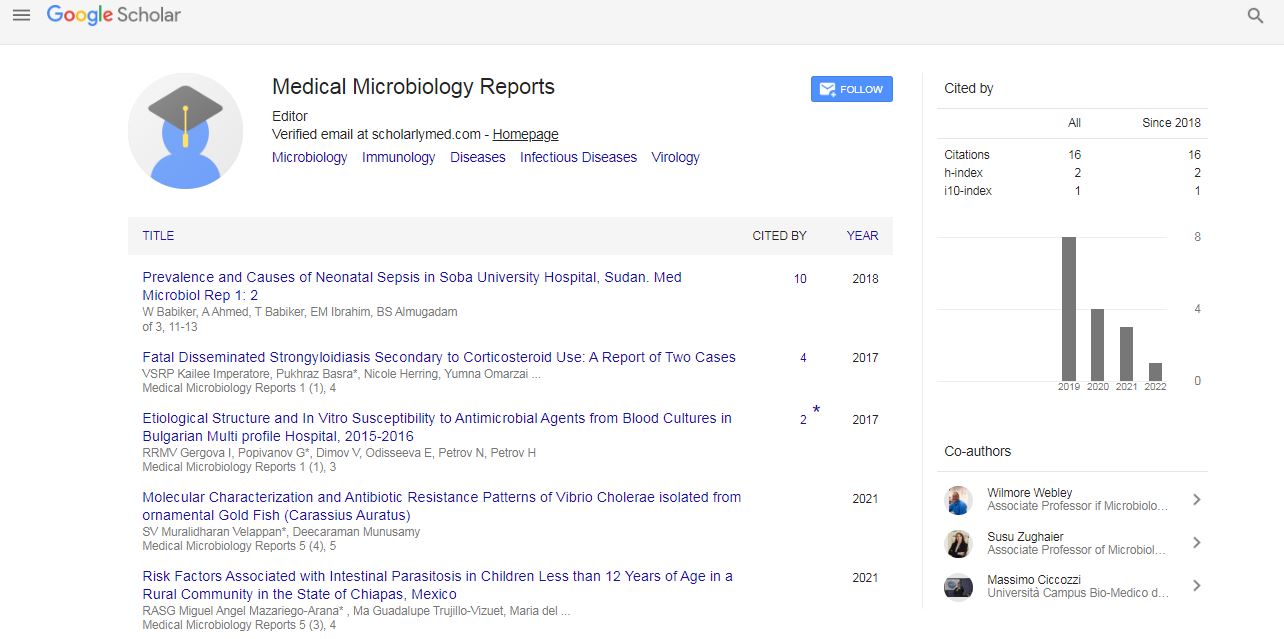Opinion Article, Med Microbiol Rep Vol: 7 Issue: 2
Symbiotic Association between Bacterial Flora and Human Health
Nejima Yokoyama*
Department of Bioscience and Biotechnology, Kyushu University, Fukuoka, Japan
*Corresponding Author: Nejima Yokoyama
Department of Bioscience and Biotechnology, Kyushu University, Fukuoka, Japan
E-mail: nejimyoko@dbb.kyushu-u.ac.jp
Received date: 22 May, 2023, Manuscript No. MMR-23-107443;
Editor assigned date: 25 May, 2023, PreQC No. MMR-23-107443 (PQ);
Reviewed date: 08 June, 2023, QC No. MMR-23-107443;
Revised date: 15 June, 2023, Manuscript No. MMR-23-107443 (R);
Published date: 22 June, 2023, DOI: 10.4172/mmr.1000339
Citation: Yokoyama N (2023) Symbiotic Association between Bacterial Flora and Human Health. Med Microbiol Rep 7:2
Description
The intricate ecosystem of the human body is a diverse and dynamic community of microorganisms thrives, collectively known as the microbiome. Among these inhabitants, the bacterial flora stands out as an important component, playing a vital role in maintaining the health and well-being.
The term "bacterial flora" refers to the population of bacteria that reside within and on the human body. These bacteria colonize various sites, including the skin, gastrointestinal tract, respiratory tract and urogenital system. While the word "bacteria" may often carry negative connotations, the truth is that the majority of these microbial inhabitants are beneficial, contributing to essential bodily functions.
The bacterial flora forms a symbiotic relationship with the human body, in which both parties benefit. These microscopic organisms have evolved in accordance with humans and their presence is essential for maintaining a healthy physiological balance. They aid in digestion, synthesize vitamins, modulate the immune system and even protect against harmful pathogens.
Within the gastrointestinal tract, the bacterial flora plays a pivotal role in the breakdown of complex dietary components that are otherwise indigestible by human enzymes. These bacteria ferment dietary fibers and produce short-chain fatty acids, which serve as an energy source for the cells lining the colon. Additionally, they contribute to the synthesis of certain vitamins, such as vitamin K and some B vitamins, which are essential for various metabolic processes in the body.
The bacterial flora even supports the development and maturation of the immune system. The presence of these beneficial bacteria helps train the immune system to distinguish between harmful pathogens and harmless substances. They stimulate the production of antibodies and regulate the activity of immune cells, promoting a balanced and effective immune response.
In addition to their digestive and immune-related functions, the bacterial flora acts as a line of defense against invading pathogens. By colonizing various sites in the body, they occupy space and compete with potentially harmful microorganisms, preventing the growth and establishment. This protective effect, known as colonization resistance, is particularly evident in the gastrointestinal tract, where the bacterial flora forms a barrier against harmful bacteria that may cause infections.
Furthermore, the composition of the bacterial flora can vary significantly among individuals, influenced by factors such as genetics, diet, age and environmental exposures. This variability underscores the uniqueness of each person's microbiome and highlights the need for personalized approaches to maintain and restore microbial balance.
As the importance of the bacterial flora becomes increasingly evident, researchers are exploring novel ways to harness its potential for therapeutic purposes. Fecal Microbiota Transplantation (FMT), for instance, involves the transfer of fecal material from a healthy donor to a recipient, aiming to restore a healthy bacterial flora. This approach has shown optimistic results in the treatment of certain gastrointestinal infections and disorders.
Conclusion
The bacterial flora represents a remarkable community of microorganisms that contribute to the overall health and well-being. Through the diverse functions in digestion, immune modulation and pathogen defense, these microscopic defenders play a vital role in maintaining the delicate balance of the microbiome. Understanding and preserving the bacterial flora is essential for promoting human health and provides the way for favorable possibilities in personalized medicine and therapeutics.
 Spanish
Spanish  Chinese
Chinese  Russian
Russian  German
German  French
French  Japanese
Japanese  Portuguese
Portuguese  Hindi
Hindi 
